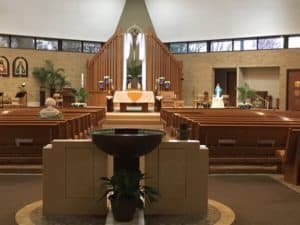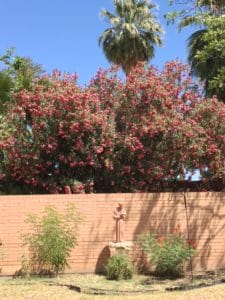Special Franciscan greetings of peace and joy on the Ascension of the Lord (7th Sunday of the Easter)! Most dioceses in the United States celebrate the feast of the Ascension on the 7th Sunday of Easter. Therefore, the background and reflection questions here will focus on the gospel for that feast. Franciscan Gospel reflection and questions are written by Fr. Paul Gallagher, OFM. They are edited by Franciscan Sister of Christian Charity Sister Anne Marie Lom and Joe Thiel. The excerpts from the Sunday readings are prepared by Joe Thiel. If you would like to read or download the complete pdf with excerpts for your prayer, please click here: Franciscan Gospel Reflection May 13 2018. Excerpts from the Lectionary for Mass for Use in the Dioceses of the United States of America, second typical edition © 2001, 1998, 1997, 1986, 1970 Confraternity of Christian Doctrine, Inc., Washington, DC. Used with permission. All rights reserved. No portion of this text may be reproduced by any means without permission in writing from the copyright owner. Please include this information when printing.
Photos: St. Agnes Parish, Green Bay, Wisconsin and Immaculate Conception Convent, Yuma, Arizona
Mark 16:15-20
He [Jesus] said to them, “Go into the whole world and proclaim the gospel to every creature. Whoever believes and is baptized will be saved; whoever does not believe will be condemned. These signs will accompany those who believe: in my name they will drive out demons, they will speak new languages. They will pick up serpents (with their hands), and if they drink any deadly thing, it will not harm them. They will lay hands on the sick, and they will recover.”
So then the Lord Jesus, after he spoke to them, was taken up into heaven and took his seat at the right hand of God. But they went forth and preached everywhere, while the Lord worked with them and confirmed the word through accompanying signs.
Background
The early Christians understood the Lord’s ascension as part of Jesus’ resurrection, and not as a separate event in the life of Jesus. This understanding is illustrated in Luke’s gospel. The events of that first day of the week include the three who go to anoint the body of Jesus and Peter all encountering an empty tomb, Jesus’ revealing himself to the disciples on the road to Emmaus, his appearance and commissioning of the disciples in Jerusalem, and lastly his ascension. In Luke all these things happen on the first day of the week.
On the first day of the week Mary Magdalene, Joanna, and Mary the Mother of James went to the tomb to anoint the body of Jesus. They found the tomb empty and were asked by two men in dazzling garments, “Why do you seek the living one among the dead?” They returned to the disciples and announced what had happened. Peter ran to the tomb and found only the burial cloth. That same day, two of them were on the road to Emmaus when Jesus himself began to walk with them, but they did not recognize him. The two were telling Jesus of the things that had happened in Jerusalem, and of the hope that they had had in Jesus. They also told Jesus that on that day some women were at the tomb and did not find the body of Jesus, but returned instead with an astonishing story that they were told in a vision that he was among the living. Then Jesus, still not recognized by the two, reinterpreted the events in light of the scriptures. That evening when they entered the town of Emmaus, the two invited Jesus to stay with them, and it was there when they broke bread together that they recognized him. They returned at once to Jerusalem and found the eleven and the disciples gathered. Those gathered told the two that the risen Jesus had appeared to Simon. And while they were all still speaking Jesus appeared. He invited them to touch him and ate some fish to reassure them that they were not seeing a ghost. Then Jesus opened their minds to understand the scriptures, and commissioned them to be his witnesses, and promised to send “the promise of my Father up you.” “Then he led them out as far as Bethany, raised his hands, and blessed them. As he blessed them he parted from them and was taken up to heaven. They did him homage and then returned to Jerusalem with great joy, and they were continually in the temple praising God.” (Summary of Luke 24, quoted 24:50-53)
Therefore to think of this feast as a commemoration of an historical event in the life of Jesus that took place separate from the resurrection would not be appropriate. Rather, the feast is an opportunity to reflect on one aspect of the full revelation of God, that is, the Resurrection.
The gospel text itself tells of the signs that will accompany the disciples’ preaching. The signs that are mentioned in this text are mostly those reported in the Acts of the Apostles. By putting them in the future at the end of the Gospel, the author is giving his hearers a great deal of assurance that Jesus is still present with the community even after the Ascension. Jesus’ presence however has changed, from an individual person distinct from them to one who is now present in the person of the disciples.
Reflection Questions
1. What are your experiences of departures in your life? (For example: moving away, going to different schools, ending a relationship, or death.)
2. When have you initiated the departure, and when has it been thrust upon you?
3. Were there any moments of blessing that arose because of the departure for you, or for the other, or for your relationship?
4. When have you felt the absence of God in your own life?
5. How were the disciples changed by Jesus’ ascension?
6. In opening line of this gospel text, Jesus asked the disciples to go into the whole world and preach the gospel to every creature. When you hear these words today, what do you hear God asking of you?
7. Can you talk to God about how you feel about being sent into the world to proclaim the gospel, or about any sense of loss that you are feeling at this time of your life, or about some other idea that arose within you from this gospel?




